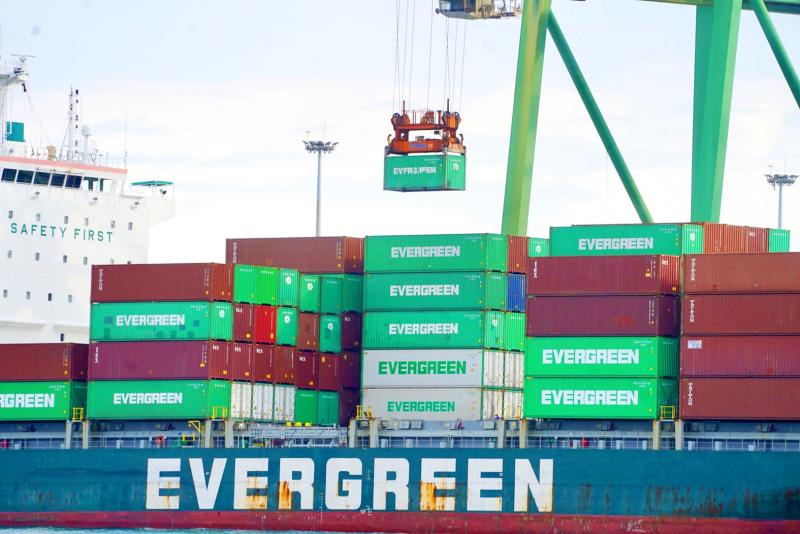Taiwan’s economy would grow 3.6 percent this year and 2.5 to 3 percent next year, Standard Chartered Bank Taiwan (渣打台灣) forecast yesterday, saying there are no signs of recession.
The slower GDP growth next year would be due to weakening demand in the US and Europe, even though exports to China would improve from this year, Standard Chartered chief economist Tony Phoo (符銘財) told a news conference.
The US economy is predicted to grow 0.3 percent next year, compared with 2.1 percent this year, and the European economy is forecast to grow 0.4 percent next year, compared with 2.3 percent this year, Phoo said.

Photo: CNA
Taiwan should continue to relax border controls to attract foreign tourists and boost domestic consumption, Phoo said, citing Thailand’s strong GDP growth on recovering tourism.
Despite the emergence of new variants of SARS-CoV-2, Taiwan has reached a high COVID-19 vaccination rate and can continue to ease its social distancing measures to boost private consumption, he added.
“Strong private consumption should help cushion the damage posed by weaker exports next year. Therefore, we see no signs of recession ahead,” Phoo said.
The central bank is expected to stop raising its policy rates next year after inflation abates, he said.
The bank said slowing exports to China could be a drag on the local economy in the second half of the year, as Chinese consumer demand remains weak amid Beijing’s “zero COVID-19” policy and lockdown measures.
“There is a slim chance that China would abandon its zero COVID-19 policy by the end of this year, as many rural areas support this policy,” Becky Liu (劉潔), a Hong-Kong based strategist at Standard Chartered, told the event via videoconference.
Since February, almost all first-tier cities have seen the virus spread continuously, and almost every day there is a small community facing new lockdown measures, Liu added.
The lockdown measures caused China’s import growth to slow in the first half of this year from a year earlier, she said, adding that the situation is unlikely to improve greatly in the second half.

SEEKING CLARITY: Washington should not adopt measures that create uncertainties for ‘existing semiconductor investments,’ TSMC said referring to its US$165 billion in the US Taiwan Semiconductor Manufacturing Co (TSMC, 台積電) told the US that any future tariffs on Taiwanese semiconductors could reduce demand for chips and derail its pledge to increase its investment in Arizona. “New import restrictions could jeopardize current US leadership in the competitive technology industry and create uncertainties for many committed semiconductor capital projects in the US, including TSMC Arizona’s significant investment plan in Phoenix,” the chipmaker wrote in a letter to the US Department of Commerce. TSMC issued the warning in response to a solicitation for comments by the department on a possible tariff on semiconductor imports by US President Donald Trump’s

The government has launched a three-pronged strategy to attract local and international talent, aiming to position Taiwan as a new global hub following Nvidia Corp’s announcement that it has chosen Taipei as the site of its Taiwan headquarters. Nvidia cofounder and CEO Jensen Huang (黃仁勳) on Monday last week announced during his keynote speech at the Computex trade show in Taipei that the Nvidia Constellation, the company’s planned Taiwan headquarters, would be located in the Beitou-Shilin Technology Park (北投士林科技園區) in Taipei. Huang’s decision to establish a base in Taiwan is “primarily due to Taiwan’s talent pool and its strength in the semiconductor

An earnings report from semiconductor giant and artificial intelligence (AI) bellwether Nvidia Corp takes center stage for Wall Street this week, as stocks hit a speed bump of worries over US federal deficits driving up Treasury yields. US equities pulled back last week after a torrid rally, as investors turned their attention to tax and spending legislation poised to swell the US government’s US$36 trillion in debt. Long-dated US Treasury yields rose amid the fiscal worries, with the 30-year yield topping 5 percent and hitting its highest level since late 2023. Stocks were dealt another blow on Friday when US President Donald

UNCERTAINTY: Investors remain worried that trade negotiations with Washington could go poorly, given Trump’s inconsistency on tariffs in his second term, experts said The consumer confidence index this month fell for a ninth consecutive month to its lowest level in 13 months, as global trade uncertainties and tariff risks cloud Taiwan’s economic outlook, a survey released yesterday by National Central University found. The biggest decline came from the timing for stock investments, which plunged 11.82 points to 26.82, underscoring bleak investor confidence, it said. “Although the TAIEX reclaimed the 21,000-point mark after the US and China agreed to bury the hatchet for 90 days, investors remain worried that the situation would turn sour later,” said Dachrahn Wu (吳大任), director of the university’s Research Center for